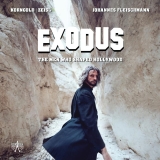 Exodus: The Men Who Shaped Hollywood; Erich Korngold: Sonate für Violine und Klavier op. 6 + Margit aus Vier fröhliche Walzer + Schneeglöckchen aus 6 Einfache Lieder op. 9; Eric Zeisl: Brandeis Sonate; Johannes Fleischmann, Violine, Magda Amara, Klavier, Günter Haumer, Bariton; 1 CD Odradek ODRCD410; Aufnahme 05/2018, Veröffentlichung 22/01/2021 (76'23) – Rezension von Remy Franck
Exodus: The Men Who Shaped Hollywood; Erich Korngold: Sonate für Violine und Klavier op. 6 + Margit aus Vier fröhliche Walzer + Schneeglöckchen aus 6 Einfache Lieder op. 9; Eric Zeisl: Brandeis Sonate; Johannes Fleischmann, Violine, Magda Amara, Klavier, Günter Haumer, Bariton; 1 CD Odradek ODRCD410; Aufnahme 05/2018, Veröffentlichung 22/01/2021 (76'23) – Rezension von Remy Franck
Die reißerisch aufgemachte CD des österreichischen Geigers Johannes Fleischmann hat nur sehr indirekt etwas mit Hollywood zu tun, und der Titel sowie die effekthascherischen Fotos haben mich zunächst mehr irritiert als inspiriert. Glücklicherweise ist der Inhalt seriöser als die Hülle.
Korngolds Violinsonate hat weder etwas mit Exil, noch mit Hollywood zu tun, denn sie ist das Werk eines Fünfzehnjährigen und entstand noch in Korngolds österreichischer Heimat, genau wie alle andere Korngold-Werke dieser CD. Soviel zum Thema Exodus!
Die Violinsonate wurde geschrieben für Carl Flesch und Arthur Schnabel und klingt gar nicht wie ein vorsichtiges Jugendwerk. Sie ist eine große, kühne 35-minütige, viersätzige Sonate, die vor harmonischer Raffinesse, lyrischem Erfindungsreichtum und gefühlvoller Großzügigkeit strotzt. Johannes Fleischmann, Österreicher wie Korngold, spielt es mit pulsierendem Elan, völlig zuckerfrei und eher sogar gepfeffert. Das Lied Schneeglöckchen beendet die CD und kann (obwohl es den Variationen im letzten Satz der Sonate zugrundeliegt) weder in der Auswahl noch in der Interpretation überzeugen.
Wie Korngold 1934, war auch Eric Zeisl in die USA ausgewandert. Auch für ihn ist die Verbindung mit Hollywood irreführend und der Slogan des CD-Covers ‘The Men Who Shaped Hollywood’ ist letztlich völlig unzutreffend, denn Zeisl hatte als Filmkomponist überhaupt keinen Erfolg.
Die hier erklingende Brandeis-Sonate aus dem Jahre 1949 entstand in der Zeit, als Zeisl als Lehrer am Brandeis Camp Institute in Santa Susana tätig war und sich dort mit der Vermittlung jüdischer Kunstmusik beschäftigte. Daher stammt der Name der Sonate, die ganz klar zu den von jüdischer Musik beeinflussten Werken des Komponisten zählt. Nach einer sehr guten Interpretation von Ambroise Aubrun und Stephen Vanhauwaert (Pizzicato-Rezension) bringen Johannes Fleischmann und die auf dem Cover der CD nicht einmal erwähnte Pianistin Magda Amara mehr Kraft und Kontraste in die Musik, die in dieser hervorragenden, sehr leidenschaftlichen, aber mitunter auch tänzerischen und lyrischen Interpretation zu einem sehr charakteristischen und wirkungsstarken Stück wird.
The luridly presented CD of the Austrian violinist Johannes Fleischmann has only very indirectly something to do with Hollywood, and the title as well as the gimmicky photos are more irritating than inspiring. Fortunately, the contents are more serious than the cover and the booklet.
Korngold’s Violin Sonata has nothing to do with exile, nor with Hollywood, for it is the work of a fifteen-year-old and was written in Korngold’s native Austria, just like all the other Korngold works on this CD. So much for the exodus!
The Violin Sonata was composed for Carl Flesch and Arthur Schnabel and does not sound at all like a cautious youth work. It is a big, bold 35-minute, four-movement sonata that bristles with harmonic sophistication, lyrical inventiveness and soulful generosity. Johannes Fleischmann, Austrian like Korngold, plays it with pulsating verve, completely sugar-free and rather even peppery. The song Schneeglöckchen closes the CD and (though it gave the theme for the variations in the sonata’s last movement) fails to convince in either selection or interpretation.
Like Korngold in 1934, Eric Zeisl had also immigrated to the USA. For him, too, the association with Hollywood is a bit misleading and the CD cover’s slogan ‘The Men Who Shaped Hollywood’ is inaccurate, for Zeisl had no success at all as a film composer.
The Brandeis Sonata from 1949 was written when Zeisl was a teaching Jewish art music at the Brandeis Camp Institute in Santa Susana. Hence the name of the sonata, which is one of the composer’s works influenced by Jewish music. After a very good interpretation by Ambroise Aubrun and Stephen Vanhauwaert (Pizzicato review), Johannes Fleischmann and pianist Magda Amara, who is not even mentioned on the cover of the CD, bring more power and contrasts to the music, which becomes a very characteristic and effective piece in this excellent, passionate, but at times also dance-like and lyrical interpretation.
























